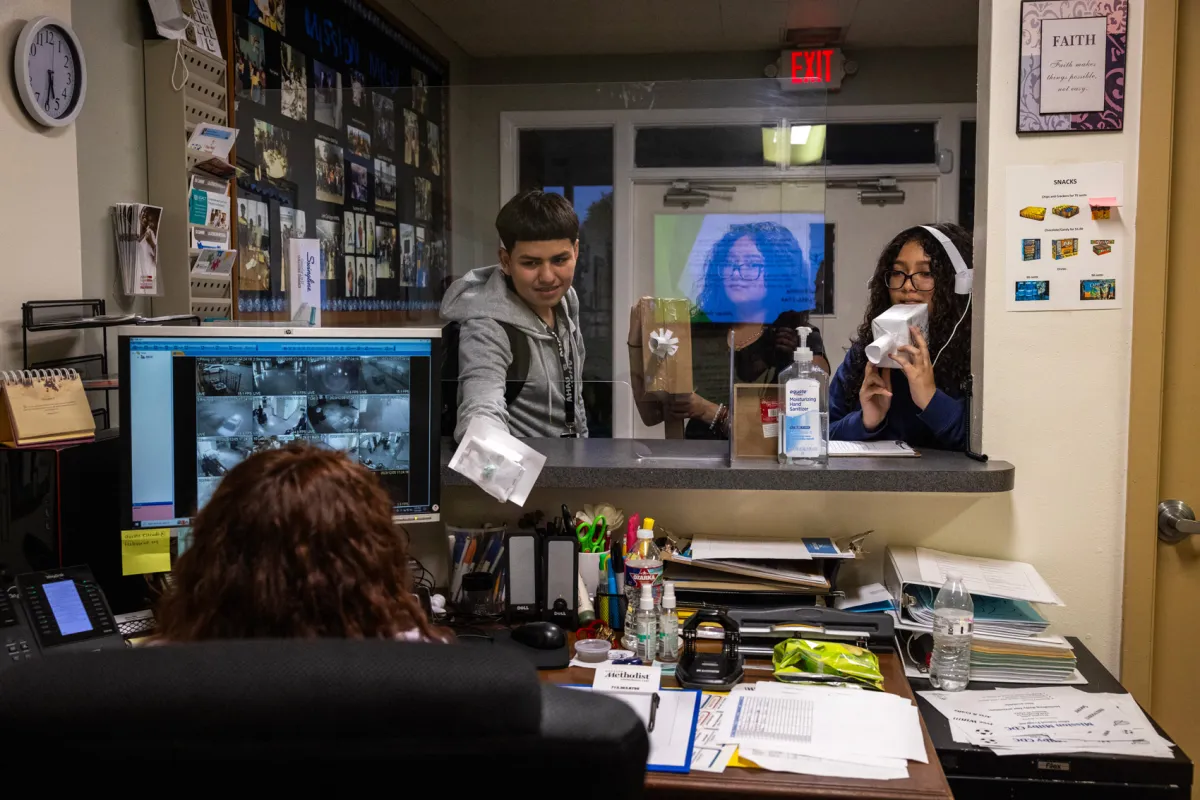Over the years, Detra Harris has received helpful resources from her grandchildren’s Houston ISD schools: coats, hygiene kits, bus passes and even dry clothing when her grandson got wet on his walk to class.
The extra support came from HISD “wraparound specialists,” employees who work in schools to aid students struggling with non-academic issues, such as hunger and homelessness.
The on-campus specialists have helped students access clothing, food, and mental health services since the program was created roughly five years ago. But now, some families and community organizations are skeptical of how students’ most urgent needs will be met under HISD’s plan to eliminate more than 100 specialists, the result of steep budget cuts.
The reductions will mean significantly fewer employees on campuses tending to students’ needs, which are often vast in a district where about 80 percent of children are considered economically disadvantaged by the state. Many of the wraparound specialist duties will fall back on teachers and other campus employees, who already have other responsibilities.
“You wouldn’t have anybody there that can say, ‘This child or this family might be struggling,’” said Harris, whose grandchildren attend Garden Oaks Montessori and Waltrip High School.
HISD officials have declined to specify how many of the district’s roughly 280 wraparound specialists will be cut, though multiple sources told the Houston Landing that about 170 people attended a virtual meeting last week in which a district administrator told affected employees about the changes.
Few school districts employed staff dedicated to students’ non-academic needs when HISD’s elected school board launched the wraparound initiative in 2017-18. The program started with about 40 specialists, one to a school.
The total continued to climb through the ouster of HISD’s board in the summer of 2023, when Texas Education Commissioner Mike Morath appointed Superintendent Mike Miles and a board of managers to run the district.
Now, in the face of a projected $450 million budget deficit this summer, Miles has said HISD cannot support the eliminated wraparound specialists, largely because the positions were paid using federal pandemic relief money that expires this year.
HISD’s budget crunch also ties back to state lawmakers deciding not to significantly increase public school funding in the 2023 legislative session, as well as Miles’ plan to spend hundreds of millions of dollars on his “New Education System” school turnaround model.
“The district is working to keep cuts as far away from kids and classrooms as possible and is continuing to invest in our teachers and leaders,” an HISD spokesperson said. “To do these things, we will have to address the challenges created by funding so many recurring costs with one-time federal money.”
‘A different way’
Miles said HISD will continue to serve students with out-of-school challenges, but “in a different way than this district has done in the past.” Some wraparound staff will continue to work at the district-level, while employees will work on several campuses in “emergency” situations, an HISD spokesperson said.
The district will also continue to operate seven “Sunrise Centers” that opened last fall — off-campus hubs that connect families with resources.
But some families and community organizers are worried the district will struggle to reach those most in need under Miles’ plan. They have questioned whether many students will travel to Sunrise Centers, which aren’t located on campuses and require transportation to-and-from schools. Skeptics also fear district-level employees won’t know the needs of students nearly as well as a staffer assigned to a campus.

Elena Korbut, executive director of Partnership for the Advancement & Immersion of Refugees, an organization that serves refugee students in several HISD schools, said she and other local nonprofit leaders have been meeting to “address the potential looming disaster” of cutting wraparound specialists. Korbut said HISD’s on-campus specialists picked up on signs from students that showed a need for intervention or help.
“They see that the student is coming to school dirty, or they’re noticing some personal hygiene issues, or that the student’s not eating,” Korbut said. “Removing a wraparound specialist several days a week from school and spreading them between Sunrise Centers is going to minimize the human connection that the wraparound specialists have with students on a daily basis.”
Clothes by Faith Executive Director Melinda Stephenson, whose organization has partnered with HISD’s wraparound department since 2018 to get free clothes to students, said she’s “waiting patiently” for more details about the district’s plan. Stephenson said she’s holding out hope that students’ needs will be met, even if the method looks different than before.
“They don’t have the money to fund that full wraparound department anymore, but it sounds like they’re not just gonna leave the kids out to dry. I know that,” Stephenson said. “It’s just disappointing that so many people had to lose a job.”
‘Find something else’
It isn’t immediately clear how much money HISD will save under its plan for addressing students’ non-academic needs. The district likely would save roughly $10 million in salaries and benefits from cutting 170 wraparound specialists. However, district officials budgeted $12 million in spending on the seven Sunrise Centers.
Kendra London, the mother of a pre-kindergarten student and third-grader at Atherton Elementary School, said removing wraparound specialists will be a devastating loss felt by many families on the district’s northeast side. London said the services provided to her family helped her “make it through the week.”
“Find something else to cut,” London said. “To take that position would be to remove a resource from the families within the community, which would be heartbreaking.”
